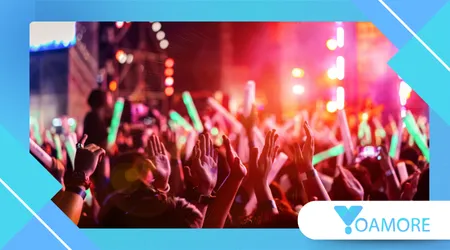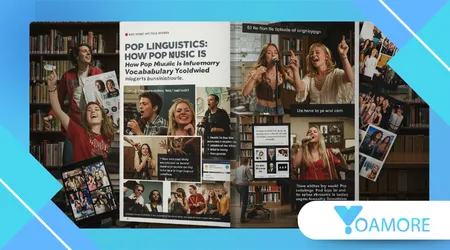Linguistique pop : comment la musique pop influence le vocabulaire mondial

La langue est vivante, constamment remodelée par la culture, la technologie et l’interaction humaine.
Annonces
La musique pop est l’une des forces culturelles les plus puissantes qui façonnent le langage aujourd’hui.
De l’argot qui commence dans un quartier et finit sur les panneaux d’affichage du monde entier, aux expressions anglaises adoptées par des locuteurs non natifs après avoir écouté des succès mondiaux, la musique est devenue un moteur linguistique.
Ce phénomène, souvent appelé Linguistique populaire, explore comment les paroles, les tendances et les rythmes s'infiltrent dans notre vocabulaire quotidien.
Mais qu'est-ce qui rend les paroles pop si influentes ? Pourquoi certaines phrases de chansons traversent-elles les frontières et font-elles partie du langage courant ?
Annonces
Et comment l’industrie musicale elle-même utilise-t-elle ce pouvoir linguistique pour se connecter avec le public ?
Cet article plonge dans le monde de Linguistique populaire, révélant comment la musique non seulement nous divertit, mais transforme également notre façon de communiquer.
Résumé
- Ce que signifie « Pop Linguistics » et pourquoi c'est important
- Comment les chansons pop introduisent et normalisent un nouveau vocabulaire
- Exemples mondiaux de changements linguistiques déclenchés par la musique
- Le rôle de la domination de l'anglais dans la culture pop
- Emprunts interculturels et propagation de l'argot
- Des avis d'experts sur la langue, l'identité et la musique pop
- Prévisions futures : comment le streaming et l'IA peuvent accélérer la linguistique populaire
Qu’est-ce que la linguistique pop exactement ?
Le terme Linguistique populaire fait référence à l’étude de la manière dont la musique populaire façonne les modèles linguistiques.
Cela va au-delà de l’analyse des paroles ; cela examine comment les auditeurs adoptent le vocabulaire, l’argot et même les habitudes de prononciation de leurs artistes préférés.
Contrairement à l’éducation formelle, qui introduit le vocabulaire par le biais de manuels scolaires, la musique pop intègre les mots dans des expériences émotionnelles.
Un adolescent peut entendre pour la première fois l'expression « no cap » (qui signifie « no lie ») non pas en classe, mais dans un couplet de rap. Le souvenir reste gravé dans sa mémoire car elle est liée au rythme, à l'identité et à l'appartenance culturelle.
+ L'hypothèse du temps fantôme : 300 ans n'ont-ils jamais eu lieu ?
Comment les chansons pop introduisent et normalisent un nouveau vocabulaire
La musique pop fonctionne souvent comme un cheval de Troie linguistique. Les auditeurs chantent des refrains entraînants sans vraiment se rendre compte qu'ils assimilent un nouveau vocabulaire.
Au fil du temps, ces mots cessent de paraître étrangers et font partie du langage courant.
Par exemple:
- argot hip-hop Des termes tels que « lit », « savage » et « flex » ont migré des sous-cultures urbaines vers l’anglais traditionnel grâce à la musique.
- K-Pop Il a popularisé des mots coréens comme « oppa » et « aegyo » bien au-delà de la Corée du Sud, désormais facilement reconnus par les fans du monde entier.
- Pop latine et reggaeton a introduit des mots comme « perreo » et « dura » dans l'argot international des jeunes, même parmi ceux qui ne parlent pas espagnol.
Des chercheurs de l'Université d'Helsinki (2023) ont découvert que les paroles de musique augmentent la rétention des mots chez les apprenants d'une langue seconde de 70% par rapport aux méthodes d'étude traditionnelles.
Ces données confirment ce que les fans savent déjà intuitivement : chanter accélère l’acquisition du vocabulaire.
+ Le changement de code sur les réseaux sociaux : un marqueur identitaire moderne
La portée mondiale de la linguistique populaire
Les mutations linguistiques provoquées par la musique ne se limitent pas à l'anglais. L'essor mondial des genres pop régionaux illustre la diffusion du vocabulaire multilingue au-delà des frontières :
- K-Pop Les fans d'Europe et d'Amérique latine utilisent couramment des expressions coréennes dans les conversations en ligne.
- Afrobeat Des artistes comme Burna Boy et Wizkid ont exporté l'anglais pidgin nigérian dans le monde entier, où des termes comme « shayo » (célébration avec des boissons) apparaissent dans les légendes TikTok du monde entier.
- Trap latin a intégré le Spanglish dans les playlists internationales, normalisant ainsi le discours hybride parmi les auditeurs de la génération Z.
En ce sens, Linguistique populaire Plus qu'un simple divertissement, c'est une forme de diplomatie culturelle. Chaque morceau viral est porteur de mots, d'accents et d'attitudes qui transcendent les frontières linguistiques.
+ Les règles de grammaire les plus étranges du monde entier
Pourquoi l'anglais domine toujours le vocabulaire musical mondial

Bien que les succès multilingues soient en hausse, l’anglais reste la force linguistique dominante dans la musique pop.
Selon l'IFPI (Fédération internationale de l'industrie phonographique), plus de 701 chansons parmi les plus populaires du classement mondial de Spotify en 2024 contenaient des paroles en anglais.
Cette domination n'est pas fortuite. Les mots anglais ont tendance à être plus courts, plus percutants et plus faciles à rimer, ce qui les rend attrayants pour un public international.
Même les artistes dont la langue maternelle n'est pas l'anglais, comme BTS ou Rosalía, intègrent des phrases en anglais dans leur musique pour maximiser leur portée.
Mais c'est ici que Linguistique populaire Cela devient intéressant : le public ne consomme pas seulement passivement l'anglais ; il le mélange avec les langues locales.
Le résultat ? Des expressions hybrides qui dérouteraient les grammairiens traditionnels, mais qui trouveraient un profond écho auprès des auditeurs.
Emprunts interculturels : comment l'argot circule à travers la musique
La musique est l'un des vecteurs les plus rapides de la mondialisation de l'argot. Une expression inventée dans une ville peut devenir virale dans le monde entier si elle est associée à un tube.
Prenons l’exemple de « YOLO » (On ne vit qu'une fois), popularisé par le morceau de Drake de 2011. L'acronyme est devenu si largement utilisé qu'il est entré dans les dictionnaires Oxford en 2014.
De la même manière, Cardi B L'emblématique « Okurrr » est passé d'un slogan personnel à un incontournable de la culture pop reconnu dans le monde entier.
Pendant ce temps, les fans de K-Pop ont répandu des interjections coréennes comme « daebak » (incroyable) dans le monde entier, prouvant que l'emprunt linguistique ne se limite pas à l'anglais.
Les chansons pop fonctionnent essentiellement comme des publicités linguistiques, amplifiant l'argot au-delà des frontières sans traduction. C'est le cœur battant de Linguistique populaire.
Avis d'experts : Pourquoi la musique façonne l'identité et le langage
Les linguistes affirment que les paroles de chansons pop n’enseignent pas seulement le vocabulaire : elles contribuent également à façonner l’identité.
La Dre Jennifer Jenkins, professeure d’anglais mondial, note que « les chansons permettent aux jeunes d’expérimenter l’identité linguistique de manière sûre et ludique ».
Lorsqu'un auditeur répète une phrase de son artiste préféré, il n'apprend pas seulement des mots ; il signale un alignement culturel.
Dire « c'est génial » au lieu de « c'est génial » place quelqu'un dans une tribu sociolinguistique spécifique.
Les psychologues ajoutent que le rythme de la musique améliore la mémorisation. Une étude de 2022 de l'Université de Cambridge a démontré que l'association de mots à une mélodie augmente les taux de mémorisation de près de 801 TP3T.
Cela explique pourquoi les gens se souviennent de versets entiers des décennies plus tard, mais oublient ce qu’ils ont étudié la semaine dernière.
L'ère numérique : streaming, TikTok et linguistique populaire accélérée
À l'ère pré-numérique, un nouvel argot pouvait mettre des années à traverser les frontières. Aujourd'hui, avec les plateformes de streaming et les tendances TikTok, il se propage en quelques jours.
- Un seul défi de danse viral peut faire entrer les paroles d'une chanson dans le vocabulaire mondial en une semaine.
- Les sous-titres, les vidéos de paroles et les traductions de fans accélèrent l’adoption en brisant les barrières linguistiques.
- Les listes de lecture générées par l’IA exposent les auditeurs à un vocabulaire multilingue sans qu’ils le recherchent activement.
Le rythme de Linguistique populaire n’a jamais été aussi rapide et sa portée n’a jamais été aussi large.
Prévisions pour l'avenir : où va la linguistique populaire ?
À l’avenir, plusieurs tendances suggèrent que la musique continuera d’influencer le langage :
- Paroles alimentées par l'IA – Alors que l’intelligence artificielle commence à co-écrire des chansons, elle pourrait introduire un argot hybride qui fusionne plusieurs langues.
- Domination du genre régional – L’Afrobeat, le Latin Trap et la K-Pop continueront d’injecter des mots non anglais dans le vocabulaire grand public.
- L'éducation par la musique – Les applications d’apprentissage des langues intègrent déjà la musique pop dans leurs cours, transformant le divertissement en pédagogie structurée.
- Micro-argot – Les communautés de fans généreront leur propre vocabulaire de groupe, adopté plus tard par la culture dominante.
En bref, la linguistique populaire est appelée à devenir un domaine d’étude encore plus central pour comprendre comment nous communiquons.
Conclusion
La musique pop est plus qu'un simple son : c'est un influenceur linguistique au pouvoir mondial. Grâce à l'argot, aux emprunts multilingues et à l'amplification numérique, elle transforme la façon dont les gens parlent, écrivent et même pensent.
Linguistique populaire révèle la relation complexe entre la culture et la langue, montrant comment le rythme d'une chanson peut résonner dans le langage courant.
À mesure que les genres fusionnent et que les publics se mondialisent, la musique continuera d’agir comme un passeport linguistique, brouillant les frontières et créant un vocabulaire partagé entre les nations.
La prochaine fois que vous vous surprenez à répéter une chanson, rappelez-vous : vous ne chantez pas seulement, vous participez à l’évolution du langage.
Questions fréquemment posées (FAQ)
1. Qu'est-ce que la linguistique pop en termes simples ?
La linguistique pop est l’étude de la manière dont la musique populaire influence la langue, le vocabulaire et l’argot à travers le monde.
2. Comment la musique pop affecte-t-elle l’apprentissage du vocabulaire ?
Les chansons associent les mots au rythme et aux émotions, ce qui les rend plus faciles à mémoriser. Les auditeurs adoptent souvent des expressions argotiques et des expressions sans apprentissage formel.
3. La linguistique populaire se limite-t-elle à l’anglais ?
Non. Alors que l'anglais domine à l'échelle mondiale, des genres comme la K-Pop, l'Afrobeat et le Reggaeton répandent le coréen, le pidgin nigérian et l'argot espagnol dans le monde entier.
4. Pourquoi certaines paroles de chansons deviennent-elles de l’argot courant ?
Parce qu'elles sont accrocheuses, faciles à répéter et liées à l'identité, la musique amplifie les phrases au-delà des frontières plus rapidement que les médias traditionnels.
5. Quel rôle joueront l’IA et le streaming dans la linguistique pop ?
Ils vont l'accélérer, en faisant circuler l'argot plus rapidement et en encourageant un vocabulaire hybride qui mélange plusieurs langues.
